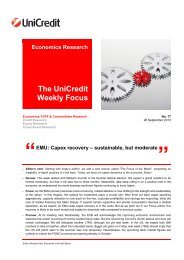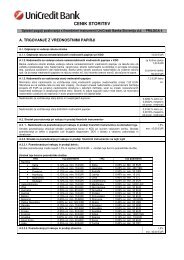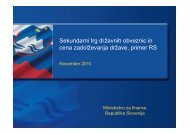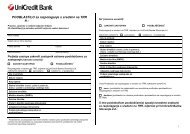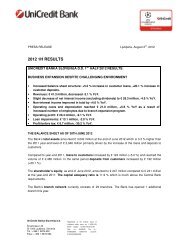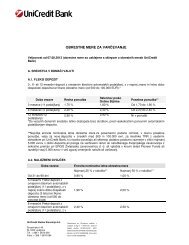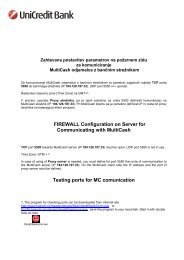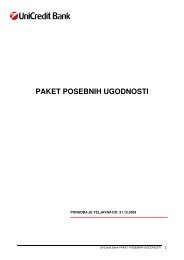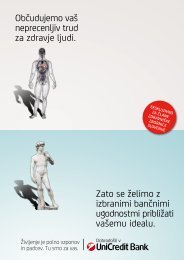Letno poroÄilo 2009.pdf - UniCredit Banka Slovenija dd
Letno poroÄilo 2009.pdf - UniCredit Banka Slovenija dd
Letno poroÄilo 2009.pdf - UniCredit Banka Slovenija dd
- No tags were found...
You also want an ePaper? Increase the reach of your titles
YUMPU automatically turns print PDFs into web optimized ePapers that Google loves.
Business ReportManaging Business RisksRisk ManagementThe year 2009 continued to show the importance of having a strongfocus on risk management and the continuous need to refine riskmanagement practices. While our risk and capital managementcontinuously evolves and improves, there is no guarantee that wecan anticipate all market developments - particularly those of anextreme nature - at all times. The risk management of <strong>UniCredit</strong><strong>Banka</strong> <strong>Slovenija</strong> d.d. is driven by the Risk Management division.In line with our expectations, the credit risk environment of 2009proved to be challenging. The instability and uncertainty of financialmarkets in 2008 caused a deteriorating economic environment alsoin Slovenia at the end of 2008 and throughout 2009, affecting boththe corporate sector as well as private individuals. Anticipatingthat our customers’ liquidity situation and creditworthiness wouldcome under pressure, <strong>UniCredit</strong> <strong>Banka</strong> <strong>Slovenija</strong> d.d. started to takepreventive and responsive measures. Already at the end of 2008 andcontinuing in 2009, the Bank has been running systematic liquiditychecks of important credit exposure customers and customer groupsas well as of credit customers in endangered industries. Further carehas been dedicated to assessing liquidity of the Bank’s customers’customers, which a<strong>dd</strong>ed scrutiny to an already comprehensivecustomer credit check. Active management of client relationship wasfurther strengthened. Where needed and based on each individualassessment of the situation and possibilities, restructuring and/orreduction of credit exposure and/or improved collateralization wasconsidered and pursued.The Bank decided to take part in the state’s guarantee scheme inorder to continue to support the Slovenian corporate sector, whileat the same time mitigating the credit risk via the partial stateguarantee.The Bank strengthened its restructuring and workout team witha<strong>dd</strong>itional staff. A special collection team was established for quickcollection of overdue customer obligations. The latter activity a<strong>dd</strong>edfurther valuable information to the Bank’s credit portfolio monitoringdatabase.In 2009, the Bank created a<strong>dd</strong>itional impairments for creditexposures in the amount of 15.6 million euros, more than twicethe budgeted net increase and almost 2.5-times of the previousyear’s net a<strong>dd</strong>-on. The increase was mainly driven by the mentione<strong>dd</strong>eterirated economic developments, although nearly one-third isattributed to a single, major corporate insolvency case. <strong>UniCredit</strong><strong>Banka</strong> <strong>Slovenija</strong> d.d. responded to the increased risk costs in atimely manner with an overall correction in credit risk pricing.While in 2009 the Bank continued to use the standardized approachfor calculating capital requirements for credit risk, the use test periodfor the Foundation Internal Ratings Based approach (F-IRB) startedon 1 st January 2009. The application package for F-IRB was handedover to the regulator in December 2009.In the field of market and liquidity risks, the Bank as well as the<strong>UniCredit</strong> Group in 2009 particularly in the first months focused onshort-term and structural liquidity. In line with the market situation,the Bank had more frequent liquidity meetings and intensifiedliquidity reporting requirements. As we have practiced in the past,we have regularly performed strict monitoring of FX, spread risk, BPVand VaR limits.In May 2009, the Bank of Slovenia performed a validation checkbased on the <strong>UniCredit</strong> Group’s intent to implement the AdvancedMeasurement Approach (AMA) for capital requirements foroperational risk. In September 2009, the regulator issued consentto the usage of the AMA approach. Based on that and in line withthe Bank’s expectations, the third quarter saw a decrease in capitalrequirements for operational risks.Based on macroeconomic forecasts for 2010, the Bank does notexpect a quick easing in the credit risk environment. The Bankwill continue to focus on adequate restructuring of stressed creditexposure, improving its underwriting processes and monitoringactivities. Regarding market and operational risk management, theBank will continue to keep its high quality level monitoring of risksin line with regulatory requirements and developments within the<strong>UniCredit</strong> Group.Finally, in terms of risk appetite, a cautious exposure expansionstrategy shall be pursued in order to create a sufficient revenue baseto maintain and improve the Bank’s loss absorption capacity.Information Technology SupportIn the area of information technology (IT) support for operations,2009 was marked with several important goals at <strong>UniCredit</strong> <strong>Banka</strong><strong>Slovenija</strong> d.d. These included: continuation of activities relatedto automation of business processes, introduction of informationtechnology support for the IRB approach for Basel standards,development of a<strong>dd</strong>itional services in the field of card operations andupgrading of document management tools.A higher level of services, responsiveness and an increasedproductivity of complex business processes through theirinformatisation (the introduction of Workflow tools), which waslaunched in 2008, continued intensely in 2009 and was alsoexpanded to new areas. Since December 2009, the informatisationof the mortgage loan-granting process for retail clients has beenin the pilot use stage. The project of informatisation of the loan-148 2009 Annual Report · <strong>UniCredit</strong> Bank



